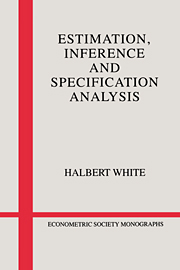Book contents
- Frontmatter
- 1 Introductory Remarks
- 2 Probability Densities, Likelihood Functions and Quasi-Maximum Likelihood Estimators
- 3 Consistency of the QMLE
- 4 Correctly Specified Models of Density
- 5 Correctly Specified Models of Conditional Expectation
- 6 The Asymptotic Distribution of the QMLE and the Information Matrix Equality
- 7 Asymptotic Efficiency
- 8 Hypothesis Testing and Asymptotic Covariance Matrix Estimation
- 9 Specification Testing Via m-Tests
- 10 Applications of m-Testing
- 11 Information Matrix Testing
- 12 Conclusion
- Appendix 1
- Appendix 2
- Appendix 3
- References
- Index
12 - Conclusion
Published online by Cambridge University Press: 05 January 2013
- Frontmatter
- 1 Introductory Remarks
- 2 Probability Densities, Likelihood Functions and Quasi-Maximum Likelihood Estimators
- 3 Consistency of the QMLE
- 4 Correctly Specified Models of Density
- 5 Correctly Specified Models of Conditional Expectation
- 6 The Asymptotic Distribution of the QMLE and the Information Matrix Equality
- 7 Asymptotic Efficiency
- 8 Hypothesis Testing and Asymptotic Covariance Matrix Estimation
- 9 Specification Testing Via m-Tests
- 10 Applications of m-Testing
- 11 Information Matrix Testing
- 12 Conclusion
- Appendix 1
- Appendix 2
- Appendix 3
- References
- Index
Summary
The results of the foregoing chapters are intended to provide empirical researchers with an appreciation of the dangers of taking one's explanatory models too literally, and with tools for coping with the necessity of using models, which by their very nature as human artifacts, may be misspecified to greater or lesser extent.
Chapter 2 of this book motivates use of the method of maximum likelihood in the presence of misspecification and establishes the existence of the quasi-maximum likelihood estimator. We see in Chapter 3 how misspecification can cause quasi-maximum likelihood estimators to fail to be consistent for parameters of interest, but that the QMLE θ generally retains an information theoretic interpretation: it is consistent for a parameter vector θ* that minimizes Kullback-Leibler information. As such,θ depends generally on the specification generating ,θ as well as on the data generation process. In Chapters 4 and 5 we see that in certain special cases, specification correct to a limited extent can allow consistent estimation of parameters of interest. For example, use of exponential family quasi-likelihood functions yields consistent estimators for the parameters of a correctly specified model of the conditional expectation of the dependent variables given the explanatory variables.
- Type
- Chapter
- Information
- Estimation, Inference and Specification Analysis , pp. 345 - 348Publisher: Cambridge University PressPrint publication year: 1994



